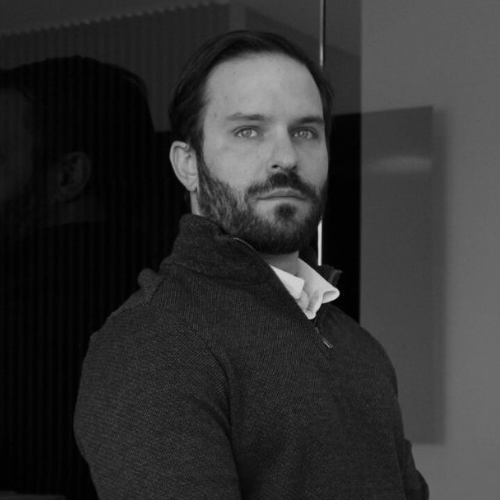Episode 368 – April 21, 2023
Listen On: Apple Podcasts | Spotify | Google Podcasts | YouTube
Looking for cash flow? We’ve got you covered. Today’s guests scour the country to not only make the numbers work but make them work BIG!
Nick Hill and Daniel Foch, hosts of The Canadian Real Estate Investor Podcast, join Matt & Adam in Kokomo Studios to discuss their investment philosophy, the tools they use to find the most attractive markets, and where they are investing today.
This episode will kickstart your investment journey and make your wallet fat. Listen up.
Guest Information

Nick Hill
Nick Hill is a Mortgage Agent, Real Estate Investor, and one of the hosts of The Canadian Real Estate Investor Podcast.

Daniel Foch
Daniel Foch is a real estate agent with over 15 years of real estate industry experience. He is also one of the hosts of The Canadian Real Estate Investor Podcast.
Episode Summary
Listen as Daniel Foch and Nick Hill from The Canadian Real Estate Investment Podcast share how they find cash flow, what they look for in a market, and their top three Canadian markets for investing!
Can you tell us a bit about yourselves?
Nick: I’m BC born and raised but now live in Toronto. I’ve stayed there for now but I try to get back to BC as much as possible. I’m probably annoying Dan by pointing out everything while we’re here.
Daniel: I’ve only ever been to Vancouver for a day at a time but I’m blown away. I like that you can get in an Uber and be anywhere in 15 minutes.
I’m a real estate agent in the GTA. But I’m referring out a lot of deals coast to coast. I’m bigger in the content space for agents in the GTA.
Tell us about The Canadian Real Estate Investor Podcast.
Daniel: We found there was a hole in the market outside of interviews. The Canadian Investor Podcast is a research podcast with two hosts going toe to toe. It’s educational. They reached out and invited us to come on and do a spin-off focused on real estate.
Nick has really taken the show and made it his baby. We cover everything from the more general like, “What is a cap rate?” to the more specific like, “What is the difference between a cap rate in Saskatoon vs Vancouver and why?”
Nobody was really doing content like this, which I think is why we were able to grow so quickly.
Nick: A lot of inspiration came from Bigger Pockets. I’ve been listening to them for over a decade and wanted the Canadian version. It’s real estate education. Our previous podcast, Brick & Mortar, was awesome but we weren’t doing anything different. It didn’t add the value that the community needed. I attribute our success to the hours we spend researching for each episode so the listener doesn’t have to.
Comparing Canada to the US and our rental renaissance:
Daniel: In the US real estate market, there are so many referrals to other cities and so much movement of capital. My theory is this is because of sports teams. America sells people on class mobility and physical mobility is a part of that.
I think we’re going through our rental renaissance in Canada. Many countries are going through that right now. Canada is a generation behind the US but two generations behind some countries in Europe. Those countries saw their huge immigration boom 50-100 years ago and now they’re rental economies. The US is farther along that line than we are. We’re just getting out of the major decline of home ownership.
The Fourth Turning by Neil Howe and William Strauss is an amazing book. They match cycles onto characteristics of the generation that is running the world at the time. It’s super interesting stuff!
Keep your finger on the pulse of Vancouver’s real estate market with our Live Wire email newsletter.
What got you interested in real estate in the first place?
Daniel: I was raised in real estate – my family business is in real estate. I wanted nothing to do with it growing up; I travelled Canada and worked on horse farms, got conscripted to the Swiss Army and then went to university to start taking things seriously. I came home ready to embrace the family business!
Nick: No conscription story for me! I was born and raised in Vancouver and don’t come from a real estate background. But I always had a drive to be an entrepreneur; I’ve started several small businesses.
I went to school for construction management and spent a few years on construction sites. I blended that with my love for business and spent time in commercial real estate and business development. I bought my first duplex and the rest was history! I linked up with Dan about six months after that and it’s been crazy ever since.
Does the podcast help with acquisitions?
Daniel: It might have made it worse! We were recently in a bidding war with a listener of the podcast. We hyped up certain markets that we’re active in. On the investment side, the podcast has inbounded some deals but on the transaction side it has helped a lot.
Our goal with the podcast is to train the next generation of real estate investors.
We’re in a broken time in Canadian real estate. A lot of Boomers are afraid of investing in real estate and taking on leverage. And then many young people think you buy something, sell it two years later and get a 30% lift. We’re trying to shed some light on the fundamentals.
We’re mostly buying small multi-family stuff. The goal is to diversify but all in good time.
Has the podcast changed your outlook on real estate investing?
Nick: Absolutely. Getting a better understanding of Canada has really helped. That has come from talking with people across the country. We’re also getting a better understanding of what the US is doing and comparing that to what we’re doing in Canada.
My passion for real estate hasn’t changed but my overall understanding of what it is in Canada and the problems we face have propelled us to work harder.
Daniel: The podcast has given me a greater sense of responsibility to the principles I talk about. Before it was easy to talk myself into a shitty deal. Now I can’t because people are watching me.
Does a deal have to excite you?
Daniel: Listening to your gut is one thing. But some deals are just about ego. Developing is a different game too.
One of the reasons why I stopped buying in the GTA, besides price, is that I would obsess over the assets I owned and check on them all the time because of their proximity. That’s a huge problem in this industry.

Everyone wants to invest in a local community where they understand the asset but I actually think that’s a disadvantage. Instead of looking at your investment as a business, it’s something you can touch, feel and fall in love with.
Is there a super power in not knowing a region?
Daniel: It helps you approach it with a beginner’s mindset. You can focus on the right things. You do need to learn the market and the municipality but you won’t have preconceived notions. It can be a blessing and a curse.
How do you find a market? What is your process going into a new market?
Daniel: I look at growth. How quickly is a municipality growing? Some municipalities have doubled in size as a result of immigration. I also look at sustainable employment and the returns. They’re all derivative of each other. I look at the average cap rate or rent divided by house price to see what’s worth looking at.
I rely on data and hope that it’s accurate. Rental data is tough. Rent Panda is probably doing the best in that area. And then we look at housing prices through the Canadian Real Estate Association price index. As long as it’s a uniform data point, I just need to see how the data changes month over month and how it compares from one location to another. For population, employment and wage growth we look at StatCan.
Nick: The first thing I came across when I was looking to invest was the barrier to entry. Ontario is very expensive so I asked, “Where can I go to get a good price per door with a good cap rate?” I wanted to be a cash flow investor; we stand by that for new investors.
Once you find a market you can get into, it’s time to go to work. There’s a ton of information you can aggregate online to build your own database.
Daniel: We encourage people to put up a dummy ad on Kijiji or Facebook Marketplace and see who they get as tenants. Are those people a good fit for you? Are you happy with the number of applications?
Nick: Once I select a market, I look high and low for other investors who are working there. Find a market that works for the return metrics you’re looking for and start talking to people there. Pull as much information from them as you can.
For me, the closest property I own is two hours away and the farthest is four hours. You can long-distance invest but you should go there or take a tour on Google Earth. Building a team of contractors and handymen is helpful too and can also bring new deals to your attention.
Are you implementing the BRRRR method?
Nick: We did an episode on why the BRRRR method doesn’t work in Canada anymore.
Daniel: The input and output formula is broken save for 30% of the housing stock in Canada.
Nick: We know a couple of guys who are doing it successfully in Alberta but I think you’d be hard pressed to get a successful BRRRR anywhere in Ontario or British Columbia. Right now, it would be very difficult.
Daniel: Ontario is making it so you can duplex almost everything in the province. And Premier David Eby is doing something similar in BC. So I think there will be a renaissance period for investors to add units and do a modified BRRR, developing properties at a small scale.
Keep your finger on the pulse of Vancouver’s real estate market with our Live Wire email newsletter.
Talk to us about how you build your real estate investment team.
Nick: Real estate to me is such a relationship business. I enjoy building relationships with people and working with the people I want to. If you’re looking for a new market, you need to start sliding into DMs, taking people for coffee, flying over to meet people, etc. It’s easy to build a team with a phone call but is that the right team for you? It takes time to build the right team.
The first few times you work with someone, don’t negotiate. The contractors we work with hate working with investors because they always low-ball them. I didn’t negotiate with my contractor for the first little bit and now he’s brought me deals, done me favours, introduced me to other people who are now key parts of our team, etc.
Be a good person. Be honest about what you’re trying to do.
Where are the real estate investment opportunities?
Daniel: We do a lot of investing in the secondary and tertiary markets outside the GTA like rural Sudbury, Cornwall and Peterborough. Those markets spiked during covid.
A lot of people in Ontario moved to BC at the very beginning of covid. Once they got priced out of the cities they went to rural BC and then Calgary and Halifax. It was a game of “drive until you qualify” and then “fly until you qualify” as the interest rate went up. The more affordable municipalities in Ontario also saw a lot of growth.
What’s happening with pricing in Ontario?
Daniel: There is downward pressure on pricing pretty much everywhere in Ontario. Some markets are down over 30-40% year over year. As soon as interest rates changed, it pulled buying power out of the market.
Nick: It’s a very credit-dependent market. Everyone was investing for major equity, refinancing and sales; no one was investing for cash flow.
Everything was cash flow negative but no one cared because you could make money on the sale. But as the interest rate, market and sentiment changed, that appreciation was gone.
What happened with inventory in the GTA as interest rates rose?
Nick: Just like BC, our inventory dried up. A lot of homeowners in bothToronto and Vancouver own their homes free and clear. Those people aren’t worried about it and they don’t need to sell.
Daniel: There’s so much equity out there. It takes a huge decline or sustained period of economic strain to create stress that is significant enough to flood the market with inventory. Will we see that? I don’t know. I think we’ll see a bit of a recession this year but immigration is strong and so is employment. We may get the soft landing everyone is hoping for.
Prices are up in Metro Vancouver this month over last and we’re seeing multiple offers. It sounds like it’s a similar story in the GTA. Is this temporary or the spring market?
Daniel: I think we’re back to seasonal cyclicality. In order to get back to the prices and sales volume of last February, you need interest rates to be back to what they were last February.
Wages haven’t gone up enough to substantiate current prices. The market should trade sideways for several years, but I don’t think there’s much more downside.
The price drop we just saw year-over-year is the worst we’ve seen in Canadian history. The sales volume is low. And that’s what is killing people in the real estate industry.
Let’s talk about how the real estate industry has been affected.
Daniel: The owners aren’t the ones suffering, it’s people in the real estate industry. They started teams, took our billboards, bought the cottage or Porsche, assuming the volume we saw in 2021 was sustainable. But now volume is down 60% in the GTA. We’re at less than 50% of the amount of commission.
Nick: Toronto is probably a horrible example for this. There are 76,000 real estate agents in Toronto and they do, on average, 1.6 transactions per year. It’s the most realtors per capita in the world. But if you’re only doing 1-2 deals per year, what are you doing?

What are the top markets in Canada for real estate investments based on your metrics?
Nick: From a cash flow and barrier to entry standpoint, which are important for beginner investors, I’d pick Edmonton, Saskatoon and Moncton.
Daniel: Moncton is probably the question mark for me. I like the market but I’m not sure if their year over year price growth will remain high. I really like Saskatchewan; the whole province has a lot of growth ahead of it.
I think the next big theme for Canada over the next 10 years will be things like potash, lithium ion, agriculture, etc. It was housing but it can’t be housing forever. So I think a lot of rural markets will see that growth.
Proximity to the US border is also important. That’s why we like Cornwall and other similar cities in Ontario. I think the Quebec City market is very inefficiently priced. It’s a great market with a lot of potential for Airbnb investors with their tourism angle.
Take out your crystal ball. Where is the Canadian real estate market in 1-3 years?
Nick: I would agree with Dan that the market could trade sideways for the next few years. Crystal balls have been smashed over the last few years. No one could have predicted what we’ve been through! Anyone’s guess is as good as mine.
If you can find a market that hasn’t been tapped out, what’s happening overall shouldn’t matter. I know investors who run their numbers at 12-15%. I don’t think interest rates will get there but if they do, those investors will be okay.
Your investing principles shouldn’t change regardless of what happens because predictions are BS for the most part.
Daniel: Everyone wants to know what will happen but I have no clue. I don’t know and the reality is, it doesn’t matter.
My guess is that a year from now we will be within 2% of current interest rates; within three years I don’t see a high fall or growth. I think the damage has been done. We’re back in the seasonal cycle and will be sideways for a while.
Nick: Immigration and density policy are things to watch. If red tape is removed, things could drastically improve. If the red tape remains and the millions of immigrants don’t have anywhere to go, there could be a mass exodus. But that’s all noise at the end of the day, so stick to your investing principles.
Keep your finger on the pulse of Vancouver’s real estate market with our Live Wire email newsletter.
The 5 Wire: Getting to Know The Canadian Real Estate Investor Podcast hosts, Daniel Foch & Nick Hill
Share a book recommendation with us.
Daniel: Awareness by Anthony de Mello. It’s almost a meditation book but he writes it like he’s yelling at you the whole time.
Nick: I’m sticking with The Fourth Turning by Neil Howe and William Strauss. I used to be a better reader but I just ingest a bunch of podcasts these days.
What new belief, behaviour or habit has most improved your life in the last few years?
Nick: Surrounding myself with people who have the same goals I do. The quote “you are the average of the five people you spend the most time with” really resonates with me. Focusing on real relationships has been huge. You should be getting as much as you’re giving.
Daniel: Going from a mindset of scarcity to abundance has been a big change for me. If you don’t have enough pie, rather than trying to cut it up, just make another pie.
What have you been binge watching lately?
Nick: I just started watching Vanderpump Rules with my girlfriend. It’s not very good. I don’t watch a lot of TV anymore. Succession is another one I like.
Daniel: Billions is a show I just started. It’s pretty good! Dirty Money on Netflix was really good too.
Favourite band or music?
Nick: I almost exclusively listen to classic rock. I built a playlist on Spotify, For the Old Boys, that has 47 hours of great classic rock music.
Daniel: My favourite band is The Eagles or A Day to Remember, which is a Florida pop-punk band.
What have you bought recently for under $1500 that has had a positive impact on your life?
Daniel: You know the electrodes the chiropractor puts on your back? You can buy those to use at home. I put those on my back a couple of times a day and it clears everything up.
Nick: A podcast microphone. Definitely a game changer! I also bought a bike. I grew up mountain biking and get a lot of peace going on bike rides.
Keep your finger on the pulse of Vancouver’s real estate market with our Live Wire email newsletter.
Episode Host

Adam Scalena
Adam is a full-service realtor, specializing in Vancouver’s best areas. His systematic approach to real estate and dedication to his clients has consistently placed him within the top 10% of realtors operating within Greater Vancouver.

Matt Scalena
Matt is real estate obsessed and considers himself a lifelong student of the Vancouver real estate market. As a co-manager of the Scalena Real Estate team, Matt prides himself on expertly advising buyers and sellers on all aspects of the fast-paced, dynamic Vancouver real estate market. He is present at every stage of the process, from that first phone call or email right through to when keys are exchanged between sellers and buyers.








